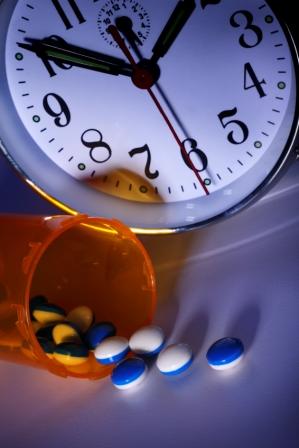As the program is conducted over a period of approximately 18 weeks, on occasion participants may have the need to take other medications, such as a course of antibiotics due to an infection for example. As a general rule, as KicStart™ is a nutritionally complete meal albeit in the form of a shake, there is no need to discontinue or disrupt the program in order to take an antibiotic "with food". KicStart™ is considered to be a food for special medical purposes.
Any pre-existing regular medications you take should be closely monitored during the course of the program and where dosage adjustments are needed these should be handled by consulting with your supervising healthcare provider as soon as possible if you have any concerns. However if you still have a query about the program and how it relates to a medical condition you have or certain medications you are taking, please contact the Healthy Weight for Life Team and ask to speak with the pharmacist on staff about your concerns.
How well do you know your medications?

It is very important that you really understand all the medications and / or supplements that you have been prescribed or that you buy directly from a pharmacy, health food store or supermarket.
Some questions to ask yourself to check your knowledge about each of your medications are:
- what is the name of the active ingredient in the tablet / capsule / syrup?
- what is the reason for taking the particular medication? eg. reduce blood pressure
- what dose should I be taking and when should I be taking it?
- are there any special directions or precautions that I need to remember? eg. take the medicine with food
If you can’t answer these questions about your medication or have trouble taking the medication as prescribed please talk to your local pharmacist or your GP. It is also very important that all the healthcare professionals you have contact with are fully aware of exactly what prescription medication, over-the-counter medication and supplements that you are taking.
The reason this is so important is that:
- some medications and/ or supplements when taken together can have unintended negative effects on one another.
- some medications sold under different names and promoted for different uses can have the same active ingredients. For example cold and flu tablets from the pharmacy may contain the same amount of paracetamol as your prescription or over-the-counter pain medication – if you take both at the same time your total paracetamol intake may be higher than is safe for you.
The Medication Record Log is a useful tool for recording all the medication and supplements that you may be taking at any given time. Your pharmacist or GP will be able to help you fill it in if needed. If you make sure you keep the table up to date and take it with you to your medical appointments, it will help your healthcare team give you the best and safest care they can.
The most common reasons why people don't take their medications as prescribed are:
- Not having a prescription filled
- Taking an incorrect dose - too much or too little
- Taking the medication at the wrong time
- Forgetting to take one or more doses
- Stopping the medication too soon

Strategies to help you improve how you take your medications
Use cues - any activity that you perform regularly that can be mentally associated with a scheduled dose.
Eg. clock times (7am & 7pm) or meal times, daily rituals such as shaving, brushing teeth, fixing your hair, before walking the dog, or listening to the daily news broadcast.
Visual or Audio Reminders
E.g. leave tablets in a prominent place, write on a calendar, use an alarm clock, set the timer on a digital watch, use an appointment organiser on your PC or PDA eg Outlook.
Dose Administration Aids
Talk to your pharmacist about having your medications packed for the appropriate time of day in a weekly blister pack.
Keep a Medication Record Log
Write down all the medications you have at home (including those bought at the pharmacy, a health food shop or in the supermarket), take this along with you when next you see your doctor or pharmacist
Learn more about your medications
Talk to your health care team (use the Medication Record Log as a prompt and discuss all the medications you take). Ask about any side effects that concern you (there may be other medication alternatives, or other ways to take the medication to minimise or avoid them). Ask about what to do if you do forget a dose.
Combination therapies
Multiple medications are now being combined in the one tablet . Talk to your doctor about whether any of these options can help you cut down on the number of medications you have to remember to take.
Medications can’t work if you don't take them and taking medications inconsistently can be detrimental so use some of the strategies above to develop a plan to help you to take your medication every day of the year, including holidays.
